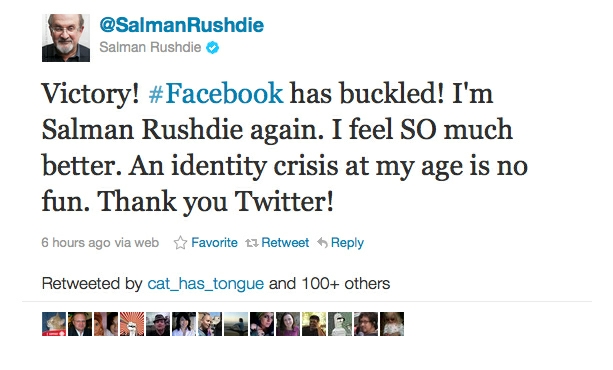Facebook Changes Salman Rushdie's Name
Award-winning writer Salman Rushdie had his Facebook account deactivated over confusion about his name. To prove his identity to the Facebook police, Rushdie provided his passport; however, his Facebook profile then displayed "Ahmed Rushdie," with his official first name, which he never uses.
Eventually, his profile was properly restored, and Facebook apologized. Mashable posted a series of Rushdie's tweets, showing the sequence of events.

This situation is the latest in the so-called "nymwars," a term that appeared on Twitter. Wired magazine covered the topic extensively when Google+ established a real-name policy. David Winer, visiting NYU scholar, explains Google's rationale for real names:
There's a very simple business reason why Google cares if they have your real name. It means it's possible to cross-relate your account with your buying behavior with their partners, who might be banks, retailers, supermarkets, hospitals, airlines. To connect with your use of cell phones that might be running their mobile operating system. To provide identity in a commerce-ready way. And to give them information about what you do on the Internet, without obfuscation of pseudonyms.
Simply put, a real name is worth more than a fake one.
Facebook's vice president of public policy, Elliott Schrage, provides a different rationale for real names:
Facebook has always been based on a real-name culture. We fundamentally believe this leads to greater accountability and a safer and more trusted environment for people who use the service.
For the Rushdie situation, Facebook admitted the mistake: "We apologize for the inconvenience this caused him." No further explanation was offered in the company's statement.
Discussion Starters:
- What, if any, privacy concerns do you have about your own Facebook profile?
- What is your take on Facebook's real-name policy? Do you agree with it? Why or why not?
- Some people prefer to have pseudonyms online, for example, students who want to protect their identify from employers searching for them online. Is this a good strategy personally and professionally?
